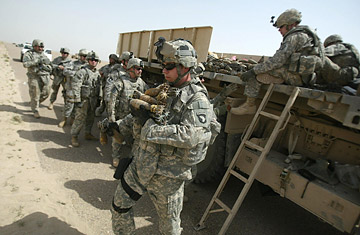
US soldiers unload projectiles as they are set-up to be detonated on the outskirts of Karbala, Iraq.
U.S. and Iraqi officials are currently locked in tense negotiations on a pact to ratify a long-term American presence in Iraq. But it's becoming increasingly clear that differences between the two sides make agreement unlikely before the July 31 deadline set by the Bush Administration.
The proposed deal is controversial both in Washington — where Democrats see it as a move to tie the hands of the next U.S. President, and are pressing for it to be subject to congressional approval — and also in Baghdad, where many Iraqi leaders fear that they're being asked to sign away their sovereignty. Negotiators for both sides emphasize that respect for Iraqi sovereignty will be the basis of any deal. But they don't appear to mean the same things by "sovereignty." Differences over the extent of control the Iraqi government would have over the deployment and activities of U.S. military forces on their territory has cast a shadow over prospects for an imminent deal. "These are negotiations between two sovereign parties," said a senior U.S. official in Baghdad, "each of which has the ability to say yes, or to say no."
Many Iraqis remain unconvinced of that, seeing in these statements an echo of the positions taken by U.S. officials four years ago when Washington first defined its idea of sovereignty for Iraq. Back in 2004, then-interim Prime Minister Iyad Allawi was in a hurry to see Iraq officially recognized as an independent state — so much so that he prevailed on the U.S. occupation authority to move forward the ostensible hand-over of control by two days. Still, despite the official transfer of sovereignty on June 28, 2004, the extent of control wielded by the Iraqi government over security forces operating in its own country has been highly questionable. For most ordinary Iraqis, the sense of being under occupation has endured, as even five years after they invaded, U.S. troops continue to exercise virtually unchecked powers to conduct military operations. And any lingering notion of Iraqi sovereignty disintegrated in the early months of 2007, when President Bush proceeded to send some 30,000 additional U.S. troops to Iraq despite objections from the elected government of Prime Minister Nouri al-Maliki.
Iraqi political factions ranging from followers of Shi'ite cleric Moqtada al-Sadr to the country's largest Sunni bloc, the National Accordance Front, want the Maliki government to press for a more muscular interpretation of Iraqi sovereignty in the negotiations over future security ties with the U.S. But Washington appears unwilling to relinquish a basic approach to the operations of the U.S. military in Iraq that leaves the country in a de facto state of occupation. Washington wants Baghdad to allow the U.S. ongoing autonomy over military operations, including the right to arrest and detain Iraqi citizens suspected of involvement in terrorist activity, militia violence or insurgency efforts. But the Iraqis are reluctant to cede such broad powers to a foreign army. This clash over defining what the U.S. military can and cannot do in Iraq suggests that negotiators will also struggle to find accord on the related issues of long-term U.S. bases, control of Iraqi airspace and immunity for private security contractors to the U.S. government.
Speaking to reporters in Washington, U.S. Ambassador to Iraq Ryan Crocker acknowledged that U.S. and Iraqi negotiators may not have matters settled at the end of July.
"Like a number of things that we're dealing with in Iraq, my focus on this is more on getting it done right than getting it done quick," Crocker said. "It is an important endeavor. Not only will this agreement deal with the status of U.S. and coalition forces in Iraq past 2008, we also intend for it to set the broad parameters of the overall bilateral relationship in every field — political, diplomatic, economic, cultural, the whole totality of the relationship."
But Iraq's government faces the challenge of reconciling its own need for the security provided by the U.S. troops and Iraqi public opinion, which is broadly in favor of setting a withdrawal date for the Americans, even if it's not immediate. The issue is also an appealing one to such opposition elements as radical Shi'ite cleric Moqtada al-Sadr, who knows that Iraqis are cool, if not hostile to the prospect of a long-term American presence.
Even as the bargaining continues, both in Washington and in Baghdad, the coming summer may see political actors who have had no part in the negotiations weigh in nonetheless, to shape their outcome.
.